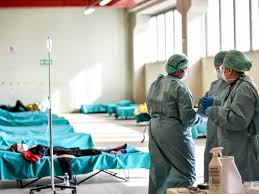
The Effect that Medicaid Expansion Will Have on the Next Pandemic
Stitt is making plans to expand Medicaid in Oklahoma, dressing it up as a state plan, but it is a pig in a dress regardless. OCPA ran a good story on the issue. We at STP have long been against the expansion as it places a tax burden upon the productive and the thrifty to pay for the bottom half of the population's health care. It also increases the federal deficit and once people get their snouts in the trough they become dependent upon the state forever more.
Stitt's plan would increase the Medicaid rolls by hundreds of thousands of men and women that are capable of working for a living. The fig leaf is raising taxes on hospitals who just raise the prices to cover the increased taxes. Taking money from TSET is a good idea rather than the money being wasted on PSA ads in the media companies so they can rake in big bucks. But we are talking about another half billion per year in new taxes if Stitt is successful in passing this boondoggle.
For years we have done stories on Medicaid expansion and used Arkansas as the local example. Their program ballooned in size and cost as people flooded onto the scheme. The work requirements and small premiums that they added to the programs went unenforced.
What causes this is the greed of the hospitals and medical care companies including the doctors that run these companies and programs. Add to that the requirement that the poor and the illegals all receive free care. Free means raising the prices on those with insurance. Add to that the insurance industry itself. Consider this:
You pay for decades into a health insurance plan and one day you get sick. When you come out you have a $5,000 deductible and a co pay of 20% for the next $5,000 in bills. Let' say you had a two day stay in the hospital. You are billed $20,000 for medical services. So you write a check for $6,000, the first $5,000 plus $1,000 of the second $5,000 in costs. Your insurance company is on the hook for the missing $14,000, sweet deal, eh?
No, it is not a sweet deal. Your insurance company had a deal with the medical care companies and the actual cost of that stay was maybe 20%% of that $20,000 or $4,000. Well, you just wrote the hospital a check for $6000, $2,000 over what was actually owed by the insurance companies. Another poor soul stayed for a month and came out with $200,000 in bills that actually cost the insurance company $20,000, so he paid $6,000 for his deductible and co pay, leaving $14,000 owed by the insurance company. Your extra $2,000 goes toward that debt. Another half dozen people have short stays, the average stay is only 4.5 days so many are there less than one or two days. At the end of the month the insurance company settles up with the hospital if any money is owed.
If this was not true, why wouldn't the insurance companies be up in arms over the extraordinarily high cost of hospital stays or medical care? They wouldn't be because they pay out a small portion of what you pay in each year in actual medical care costs. Then there are the uninsured patients that come in and pay the inflated prices or settle for half of the inflated prices and the hospital makes great profits although they have to wait for their money or hire lawyers to collect it.
You don't really think an aspirin at a hospital costs $20.00 do you?
This session the Chamber of Commerce is split in two camps, the regular businesses and the medical businesses. This fake tax the hospital scheme floated by Stitt has been tried before and it was successful. Tax them 10% and they raise the rates by the same amount AND pass along the tax anyway like a sales tax buried in the cost of the care.
And there is a second part to this past the public cost. South Korea has dealt with their Wuhan virus outbreak quickly and effectively with a lower death toll. Italy has struggled because it has government health care... fewer hospitals, less motivated workers and doctors, fewer doctors and health care workers due to the subsidized and regulated medical industry. Is that what we need or should we look at the 2,000 independent labs that Trump quickly lined up to start the automated testing for the Wuhan virus?